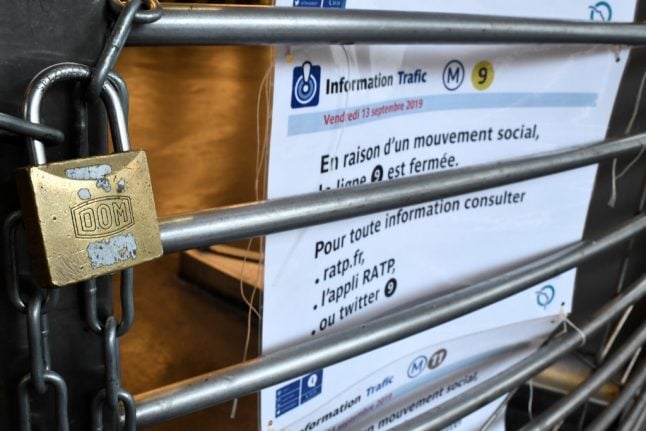Starting on Thursday, December 5th, workers across France will walk out to protest at plans to reform the French pension system. Some unions have called for unlimited strike action.
Among the workers who will be striking are employees of RATP, which runs Paris' public transport system, SNCF rail employees, air traffic controllers and airline ground crew, hauliers, teachers, civil servants, rubbish collectors and notaires.
READ ALSO France December strikes 'Expect major disruption that could last until the New Year'

When public transport workers in France strike they are required to give their employers 48 hours notice that they intend to walk out. Once bosses know how many people will be at work, they can then publish strike timetables showing exactly how many services they will be able to keep running.
And in Paris, that does not amount to very many.
On the Metro 11 lines will be closed altogether. They are lines 2, 3, 3bis, 5, 6, 7bis, 8, 10, 11,12 and 13.
Lines 4, 7 and 9 will be running during rush hour only – from 6.30am to 9.30am and 5pm to 8pm. On line 4 one in three of the normal services will be running during those times and on lines 7 and 9 it will be one in four.
Only lines 1 and 14 – which are automated so do not need drivers – will be running a normal service but are expected to be extremely crowded. If the crowds become a safety risk these too could be closed.
On the RER suburban train service line A and line B – which connects Paris to its two main airports – will only be running during rush hour with 50 percent of normal service on line A and 30 percent on line B.
READ ALSO Six ways to get round Paris without public transport
Lines C and E will be running two trains per hour with some stations out of service and line D will be running four trains per hour.
The bus service will also be badly hit, with around an average of around one in three services running.
On the city's tram lines 1, 2, 3a, 3b and 5 will only be running during rush hour with one in three of the normal services running.
Lines 6, 7 and 8 will be running all day, with half services on line 6 and one in three on lines 7 and 8.
At this stage it is not clear how long the strike will continue for, but transport bosses are making preparations for at least the first week.
Detailed timetables for Friday will be published at 5pm on Wednesday, but services are likely to be largely the same.
RATP bosses have declared the weekend of December 7th and 8th a 'sacrifice' weekend, so will be running possibly even fewer services in order to concentrte their resources on getting commuters to and from work.
Many French people have already booked days off on Thursday and Friday, but if the strikes are continuing on Monday, December 9th transport bosses anticipate that being a very busy day as people return to work.
As the strike action covers the whole country, disruption will not be limited to Paris with other major cities such as Bordeaux, Lyon and Montpellier posting strike notices.
Transport on the national SNCF rail service will be badly hit, with around 90 percent of trains cancelled. Click here for more details.
Air travel will also be affected as air traffic controllers and airline ground crew strike – about one fifth of flights are cancelled on Thursday. Click here for more details.
And road travel could also be affected as hauliers join the strike.
Separately, a haulage union has announced that it will be staging rolling roadblocks across France on Saturday in a protest over fuel tax, which is likely to add to the general transport misery.
And in addition, a blockade of oil refineries is currently ongoing which is leading to filling stations across the country running short of petrol and diesel.
And in Paris police have ordered shops, bars and restaurants in some sections of central Paris to close in Thursday over fears of violence at 'yellow vest' protests.
The Local has put together a December strikes section, click here to see all the latest transport information and strike news.



 Please whitelist us to continue reading.
Please whitelist us to continue reading.
Member comments